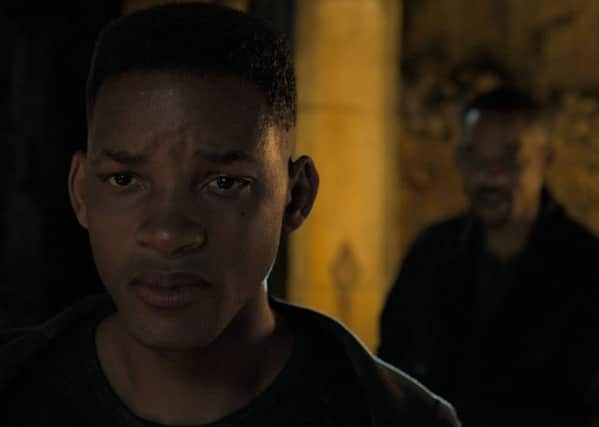Film reviews: Gemini Man | The Day Shall Come | Abominable | American Woman


Gemini Man (12A) *
The Day Shall Come (15) ***
Abominable (U) ***
American Woman (15) ***
The questionable deployment of technology is one of the themes and one of the problems with Gemini Man, a sci-fi thriller that pits Will Smith’s middle-aged hitman against his cloned younger self. Using the de-ageing effects pioneered in David Fincher’s Benjamin Button and now used regularly in everything from Marvel films to Martin Scorsese’s forthcoming The Irishman, the film casts Smith as both characters and yet, even with today’s cutting-edge CGI, his onscreen clone still has a whiff of The Sims about it, especially when the film tries to show off by having present-day Smith and The Fresh Prince of Bell Air-aged Smith confront each other for the first time in a daylight cross-city chase through the streets of Cartagena.
The film’s failure to navigate its way out of this uncanny valley is compounded by director Ang Lee’s even more distracting choice to shoot Gemini Man using the hyper-real high-frame-rate technology Peter Jackson deployed on the first Hobbit movie and Lee subsequently used in his little-seen 2016 film Billy Lynn’s Long Halftime Walk. The super-crisp 3D images that result give Gemini Man the look of a live theatre broadcast. Indeed, it’s so lacking in cinematic magic it becomes impossible to enjoy it even on the level of the high-concept action blockbuster it’s intended to be.
Advertisement
Hide AdNot that it works especially well in that department either. Having started life in the late 1990s as a speculative thriller ripped from contemporary headlines (the script contains references to Dolly the sheep), it feels as if the concept has curdled in the 20-plus years it’s taken for the special effects to become financially feasible. Fleshed out by various A-list screenwriters (Game Of Thrones creator David Benioff and Hunger Games screenwriter Billy Ray among them), it’s built around a fairly rote assassin-betrayed-by-his-government plot, with Smith’s veteran black ops agent, Harry Brogan, forced to go on the run after discovering that his last job before self-imposed retirement was really a covert mission to eliminate an innocent scientist.
What follows is an amalgam of watered-down conspiracy thriller tropes as his agency – led by Clive Owen in the sort of nefarious company man role he can do in his sleep – attempts to clean up its mess by sending Brogan’s secret clone after him because, well, the only person qualified to kill a super-assassin like Brogan is a super assassin like Brogan. Sadly, what should be this film’s novel twist just feels like a naff clone of Rian Johnson’s meticulously worked out time-travel thriller Looper – minus the meticulously worked out time-travel stuff. Mary Elizabeth Winstead does add a little bit of a spark as the rookie surveillance agent press-ganged into helping Smith, but she’s underserved by a film that makes a point of not turning her into Smith’s younger love interest, yet still contrives to have her disrobe in the middle of an action sequence.
There’s a bit of a dog-whistle quality to Chris Morris’s new film The Day Shall Come. The maverick British satirist’s first film since the excellent Four Lions finds him taking aim at the institutional ineptitude and systemic racism of America’s security services, zeroing in on a plausibly absurd scheme by the FBI to meet its counter-terrorism targets by entrapping a delusional but harmless black revolutionary preacher (a wonderfully guileless performance by Marchánt Davis) into becoming an arms dealer, even though he’s against guns and really just wants to use his fledgling movement to prevent gentrification in his Miami neighbourhood. As the FBI agent who targets him, realises her mistake then finds herself unable to right her wrong without ruining her career, Anna Kendrick leads a more-than-capable cast, but both the script and the performances fall back on that bumbling, throw-away style familiar from TV shows such as The Thick of It and Veep and neither the humour nor the horror it’s trying to expose really connects with the current moment. It plays more like a film about the Bush/Cheney era than Trump’s America.
Kicking off with a yeti’s escape from captivity, the CG animated adventure Abominable pitches itself firmly at the younger end of the family film market as said yeti hides out in Shanghai where he’s befriended by a violin-playing teenage outsider (Chloe Bennet) who enlists her cousin and the nerdy kid next door to help get him back to his home on Everest. A little bit ET, a little bit Spirited Away, a little bit Jurassic Park, the film offsets the familiarity of its story with some imaginative set pieces and beautifully rendered details that help bring its Asian settings to life. Eddie Izzard is good value too as the megalomaniac zoologist determined to expose the existence of yetis to the world.
As a blue-collar mother dealing with the disappearance of her teenage daughter, Sienna Miller gets a great showcase for her talents in American Woman. Directed by Jake Scott, the film focuses more on her than the mystery of her daughter’s disappearance; at various points it jumps ahead years at a time to show the resilience required to live through tragedy and the strength it subsequently gives her to break free from the cycle of bad relationships she finds herself in. Christina Hendricks and Aaron Paul co-star. ■